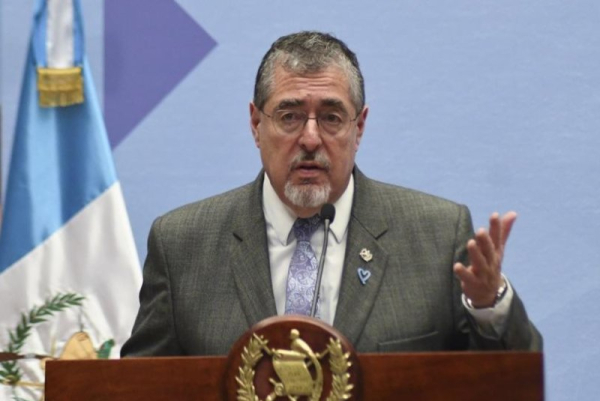

Guatemalan President Bernardo Arevalo, who formally submitted the money-laundering bill to Congress on Tuesday, speaks a day earlier at a press conference in Guatemala City. Photo by Alex Cruz/EPA
The Guatemalan government has introduced key legislation to modernize its money laundering laws and prevent the country from being added to the international financial system’s “gray list” — a designation that could raise borrowing costs and limit access to credit.
President Bernardo Arévalo formally submitted the bill to Congress on Tuesday, calling it a strategic tool to strike at the “heart” of organized crime and drug trafficking.
During the launch of a program aimed at integrating Guatemalan companies into Walmart’s supply chain in Central America, U.S. Ambassador Tobin Bradley stated that “the new anti-money laundering law is a platform for transparency and for attracting more investment to Guatemala.”
The proposal updates laws from 2001 and 2005 that officials say are outdated and inadequate for confronting modern money laundering and illicit financing schemes.
It expands the range of entities required to implement controls, report suspicious transactions and appoint compliance officers. The bill also includes reforms to the Penal Code, Commercial Code, Law Against Organized Crime and private security regulations.
If the reform is not approved and implemented this year, Guatemala risks being placed on the “gray list” of the Financial Action Task Force, an intergovernmental organization created in 1989 by the G7.
The list includes jurisdictions with strategic deficiencies in their anti-money laundering and counter-terrorist financing systems. Countries on the list are under increased monitoring and must address shortcomings within set timeframes.
“Being added to this list would significantly restrict international transactions, raise the cost of external financing and, in turn, limit access to credit. It could also lead to local banks losing the ability to work with international banks, making it harder to carry out essential operations for the people of Guatemala — such as remittances, international payments or letters of credit for exporters,” Arévalo said.
The initiative’s legislative prospects depend on the political support the government can secure among various blocs in Congress, where it holds a minority.
The executive branch said it has begun informal talks with congressional blocs and plans to make formal presentations to committees and party groups once Congress returns from recess.
Guatemala has faced warnings from Financial Action Task Force Latin America since 2022 for failing to pass key reforms. The Inter-American Development Bank, the International Monetary Fund and the World Bank have warned the country that without new legislation, a poor assessment will be inevitable at the next task force plenary meeting, which is likely in October.
The Arévalo administration views the reform as one of its most significant efforts to modernize the country’s institutional framework.